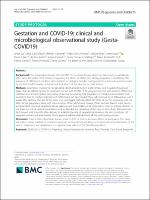| dc.contributor | Vall d'Hebron Barcelona Hospital Campus |
| dc.contributor.author | Suy Franch, Anna |
| dc.contributor.author | Garcia Ruiz, Itziar |
| dc.contributor.author | Carbonell Socias, Melchor |
| dc.contributor.author | García Manau, Pablo |
| dc.contributor.author | Rodó Rodríguez, Carlota |
| dc.contributor.author | Maiz Elizaran, Nerea |
| dc.contributor.author | Sulleiro Igual, Elena |
| dc.contributor.author | Esperalba Esquerra, Juliana |
| dc.contributor.author | Fernández Hidalgo, Nuria |
| dc.contributor.author | Frick, Marie Antoinette |
| dc.contributor.author | Camba Longueira, Fátima |
| dc.contributor.author | Pumarola Suñé, Tomàs |
| dc.contributor.author | Carreras Moratonas, Elena |
| dc.contributor.author | Antón Pagarolas, Andrés |
| dc.date.accessioned | 2021-06-11T12:44:52Z |
| dc.date.available | 2021-06-11T12:44:52Z |
| dc.date.issued | 2021-01-22 |
| dc.identifier.citation | Suy A, Garcia-Ruiz I, Carbonell M, Garcia-Manau P, Rodo C, Maiz N, et al. Gestation and COVID-19: clinical and microbiological observational study (Gesta-COVID19). BMC Pregnancy Childbirth. 2021 Jan 22;21:78. |
| dc.identifier.issn | 1471-2393 |
| dc.identifier.uri | https://hdl.handle.net/11351/6058 |
| dc.description | Coronavirus SARS-CoV-2; COVID-19; 2019-nCoV; Embaràs; Transmissió vertical |
| dc.description.sponsorship | The study has been awarded with a Spanish Government grant (Instituto de Salud Carlos III: COV20/00188). It covers the expenses for transporting, processing and analyzing samples, database creation and maintenance, and hiring support staff. |
| dc.language.iso | eng |
| dc.publisher | BMC |
| dc.relation.ispartofseries | BMC Pregnancy and Childbirth;21 |
| dc.rights | Attribution 4.0 International |
| dc.rights.uri | http://creativecommons.org/licenses/by/4.0/ |
| dc.source | Scientia |
| dc.subject | COVID-19 (Malaltia) - Transmissió |
| dc.subject | Embaràs |
| dc.subject.mesh | Infectious Disease Transmission, Vertical |
| dc.subject.mesh | Coronavirus Infections |
| dc.subject.mesh | Pregnancy |
| dc.title | Gestation and COVID-19: clinical and microbiological observational study (Gesta-COVID19) |
| dc.type | info:eu-repo/semantics/article |
| dc.identifier.doi | 10.1186/s12884-021-03572-4 |
| dc.subject.decs | transmisión vertical de enfermedades infecciosas |
| dc.subject.decs | infecciones por Coronavirus |
| dc.subject.decs | embarazo |
| dc.relation.publishversion | https://bmcpregnancychildbirth.biomedcentral.com/articles/10.1186/s12884-021-03572-4 |
| dc.type.version | info:eu-repo/semantics/publishedVersion |
| dc.audience | Professionals |
| dc.contributor.organismes | Institut Català de la Salut |
| dc.contributor.authoraffiliation | [Suy A, Carbonell M, Garcia-Manau P, Rodo C, Carreras E] Servei d’Obstetrícia, Vall d’Hebron Hospital Universitari, Barcelona, Spain. [Garcia-Ruiz I] Servei d’Obstetrícia, Vall d’Hebron Hospital Universitari, Barcelona, Spain. Universitat Autònoma de Barcelona, Bellaterra, Spain. [Maiz N] Servei d’Obstetrícia, Vall d’Hebron Hospital Universitari, Barcelona, Spain. Unitat de Medicina Fetal, Servei d’Obstetrícia, Vall d’Hebron Hospital Universitari, Barcelona, Spain. [Sulleiro E, Anton A, Esperalba J, Pumarola T] Servei de Microbiologia, Vall d’Hebron Hospital Universitari, Barcelona, Spain. [Fernández-Hidalgo N] Servei de Malalties Infeccioses, Vall d’Hebron Hospital Universitari, Barcelona, Spain. Universitat Autònoma de Barcelona, Bellaterra, Spain. [Frick MA] Unitat de Patologia Infecciosa i Immunodeficiències de Pediatria, Vall d’Hebron Hospital Universitari, Barcelona, Spain. [Camba F] Servei de Neonatologia, Vall d’Hebron Hospital Universitari, Barcelona, Spain |
| dc.identifier.pmid | 33482757 |
| dc.identifier.wos | 000612927700005 |
| dc.rights.accessrights | info:eu-repo/semantics/openAccess |

 Àrea privada
Àrea privada Contacte
Contacte







